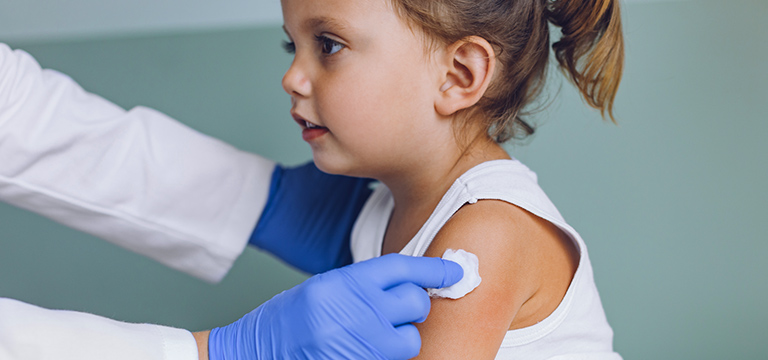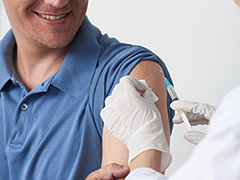The Importance of Childhood Vaccinations

Vaccines that are given during childhood are critical to protecting long-term health. Infants have natural immunity given to them by their mothers in the earliest months of life. That immunity begins to wane over time and then vaccines take over to help protect babies and children. Some vaccines require a booster — that’s just a follow-up dose that helps reinforce defense against illness as children approach school age.
The U.S. Centers For Disease Control and Prevention (CDC) has created a helpful vaccine schedule. This table serves as a guideline for when each vaccination is administered and if it requires a booster shot.
| Name of Vaccine | Age | How many shots? |
|---|---|---|
| Hepatitis B | Birth | A second at 1-2 months, a third at 6-18 months |
| Rotavirus (RV) | 2 months | A second at 4 months, a third at 6 months |
| Diphtheria, tetanus, and whooping cough (DTaP) | 2 months | A second at 4 months, a third at 6 months, a fourth at 16-18 months; then every 10 years |
| Haemophilus influenzae type b (Hib) | 2 months | A second at 4 months, a third at 6 months, a fourth at 12-15 months |
| Pneumococcal conjugate vaccine PCV13 | 2 months | A second at 4 months, a third at 6 months, a fourth between months 12 and 15 |
| Inactivated Polio Vaccine (IPV) | 2 months | A second at 4 months, a third at 6-18 months, a fourth at 4 to 6 years |
| Influenza | 6 months | Repeat yearly |
| Measles, mumps, and rubella (MMR) | 12–15 months | A second at 4-6 years |
| Varicella | 12–15 months | A second at 4-6 years |
| Hepatitis A | 12–23 months | A second at 6 months after the first |
| Human papillomavirus (HPV) | 11–12 years old | 2-shot series 6 months apart |
| Meningococcal conjugate (MenACWY) | 11–12 years old | Booster at 16 years old |
| serogroup B meningococcal (MenB) | 16–18 years old | no follow-up shot |
| Pneumococcal (PPSV23) | 19–65+ years old | no follow-up shot |
Vaccinations are important for protecting people. They also help protect society as a whole. Widespread vaccinations make it less likely that a susceptible person will come into contact with another person carrying a specific disease.
Vaccines work by teaching the body to recognize disease and then act against it. The body is then able to make antibodies against the virus or disease. This built up immune response helps the body fight off an actual infection.
The statistics speak for themselves:
· According to the World Health Organization (WHO) Polio cases have decreased by more than 99% since
1988 due to vaccines.
· The WHO also estimates vaccines prevent 2 to 3 million deaths each year.
· Between 2000 and 2016, the worldwide rate of measles deaths fell by 86% due to vaccines.
Worried about vaccine safety? You don’t have to be. All approved vaccines are rigorously tested. They go through many rounds of study, examination and research. Any side effects are typically mild in nature and rarely occur.
As a Service Benefit Plan member, everyone on your plan can access a wide range of preventive care services including routine vaccinations—at no cost—when seeing a Preferred provider.


